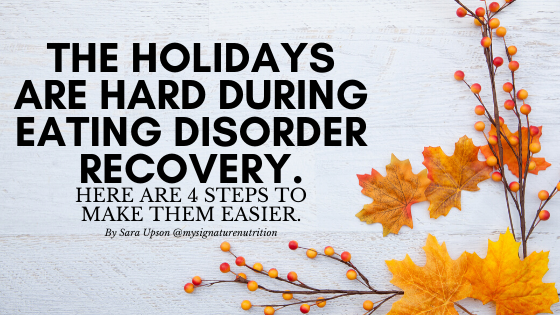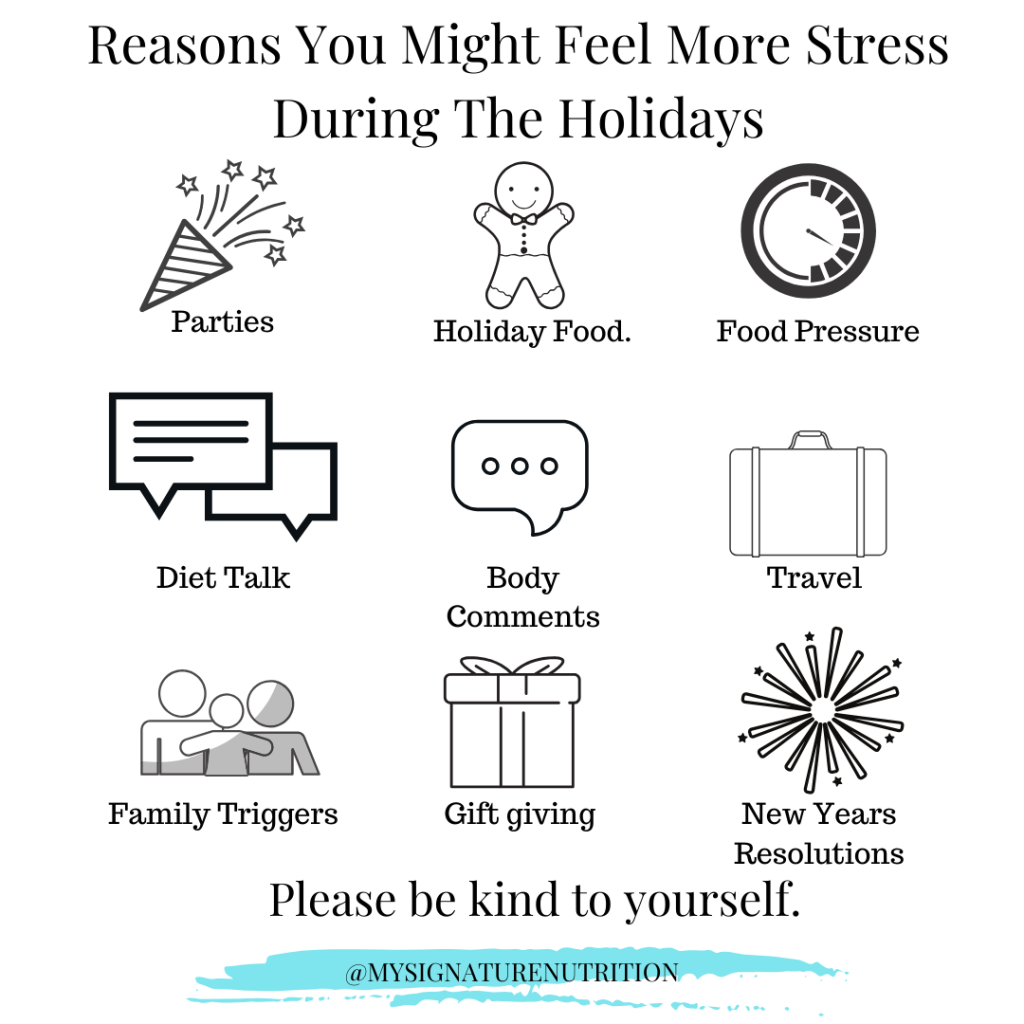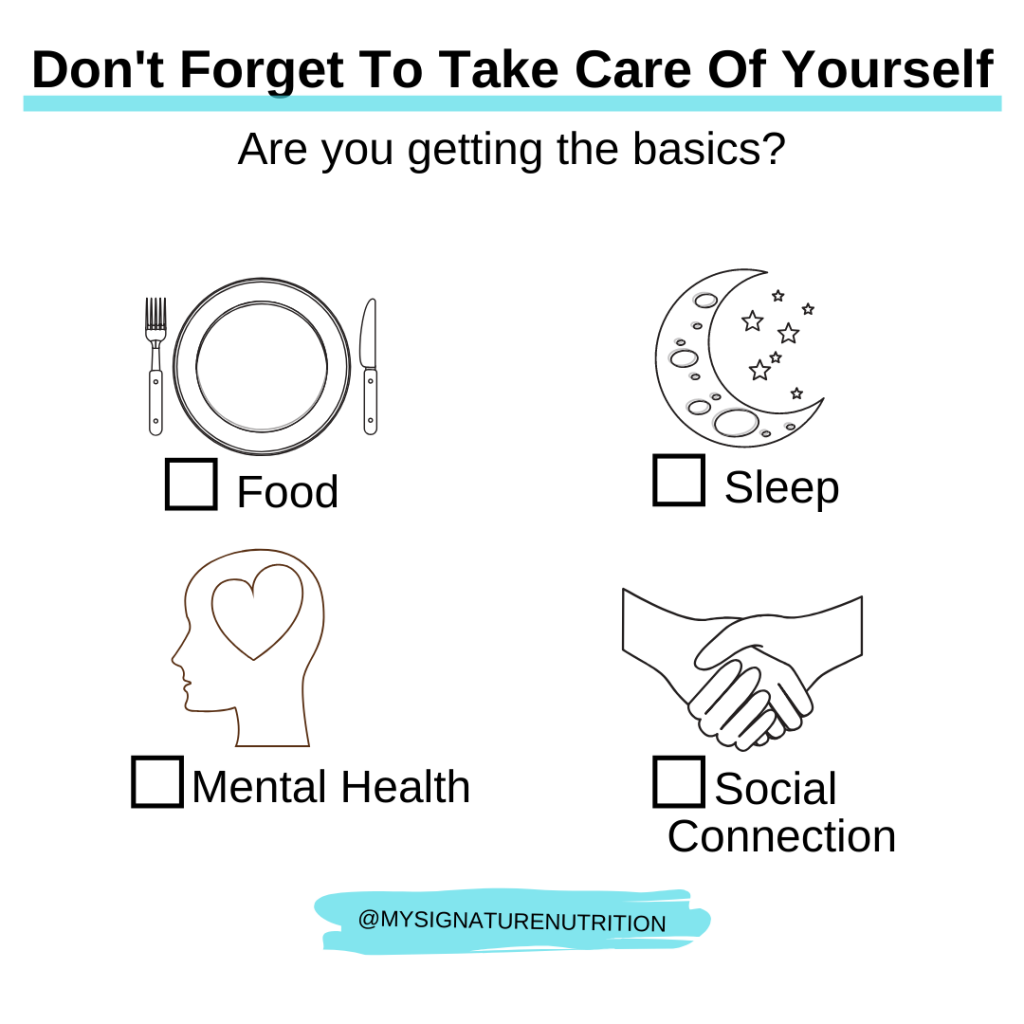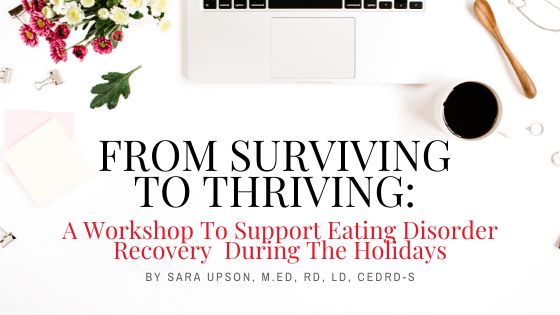The Holidays Are Hard During Eating Disorder Recovery. Here are 4 steps to make them easier.
November 11th, 2019 by Sara Upson

The holidays are fun- but they’re also stressful. There’s a lot going on- increased parties/events, food, food pressure, special food, diet talk, body comments, travel, family triggers, diet commercials, new years, family, gift giving, budgeting, etc. whew, It’s a lot!
Because the holidays are stressful it can often lead to increased thoughts, urges and behaviors. Usually when this happens, I hear my clients say things like- “I shouldn’t be struggling.” “ Nothing’s really going on.” “I don’t know why I’m stressed.” When the reality is- there’s so much going.

Checking in with yourself and building self-awareness is vital to support your recovery- especially during this time of the year.
Here are four steps to help you get started.
1. Reject Diet Culture
When you’re feeling overwhelmed with the holiday and all the stuff that comes with it, it can be tempting to listen to the rules from diet culture (or the eating disorder) about what you should do to feel better (aka diet, restrict, change your lifestyle, 30 whole days of specific eating, a 30 day challenge, etc.)
Your desire to feel better- to feel more in control- is normal. The holidays are stressful and there’s often such a focus on food and body. And of course, diet culture will capitalize on this and offer a “solution.” In reality though, it’s all lies!

Diet culture is not a solution to the stress you experience during the holidays. It won’t make eating better. The truth is- diet culture solutions just add another layer of stress to an already stressful time. In fact, it’s a guaranteed way to feel more stressed and overwhelmed about food- not better. It’s also a guaranteed way to be less present at events and holiday parties, lead to reactive eating, and/ or feeling out of control with food.
Unfortunately, diet culture will be everywhere because this is the diet industry’s busiest time of year. It’s not just friends, family, colleagues, but also the never-ending stream of diet ads and commercials.
And even worse- diet culture (and the people in it ~75% of people) will applaud you for your efforts/ whatever you’re doing. At first this might feel good but eventually it will just lead to feeling bad.
Planning a future diet or new years resolutions around food, weight, body, or fitness- doesn’t help you either. They set you up to think about your body more (in a negative way), increase food thoughts, create deprivation, and lead to reactive eating (with thoughts like “I better eat all the foods now- while I can have them ).

So skip the new years resolution (unless it’s that you won’t diet in the new year). And try to avoid people talking about their resolutions because that can be just as triggering.
To avoid falling into the diet culture trap- you must tell diet culture no and commit to not dieting (now or in the future). Eliminate diet culture in your life as much as possible- check out my free guide: The Ultimate Guide To Become A Diet Culture Dropout for a thorough list (+ more) on how to get started.
And instead of following diet culture rules, focus on eating consistently and on choosing foods that sound good to you. It’s okay to enjoy your food, to have as much as you want, to decline food, to listen to your body, and do what’s supportive and best for you and your recovery.

2. Take Care of the Basics
With so many things going on during the holidays it’s easy to find yourself overwhelmed and over committed. This of course increases stress and the busy-ness of everything makes it harder for you to do the basic things that you need to do for yourself: food, sleep, stress management, boundaries, exercise (if applicable), social connections, fun, etc.
As these basics begin to slide it almost always leads to an increase in thoughts, urges and behaviors. Why? Because you’re not getting what you need. For a little while you may be able to survive like this, but at some point it will become too much and lead back to increased struggle.
To prevent getting to this space you must prioritize your needs. Make self-care a priority, establish boundaries- and particularly when it comes to food and eating- have a plan and follow it.

Doing the basics will help you experience more joy and ease during the holidays.
3. Have a plan for getting back on track if you struggle with behaviors
The holidays + holiday stress increase the likelihood of struggling with thoughts, urges and behaviors.
In addition to having a plan for the basics, it’s also important to have a plan for what you’ll do to get back on track if you struggle. You can break it down as simple as a list of what you’ll do if you have thoughts or urges and what you’ll do if you have behaviors.
Create a list of what you’ll do if you struggle and then go back and make it more specific. For example, Will you reach out for support? To who? What coping skills will you use? What else can you do? What do you need to support you with this?
Having an idea in mind will help you when things get tough. You may not even need it- but having a plan in place already helps to reduce the stress of what ifs- which better sets you up to be present and enjoy the holiday.
It’s kinda like that saying- failing to plan is planning to fail. I wouldn’t say it’s that straightforward but that it could impact your recovery.
4. Be Kind With Yourself (aka Self- Compassion)
Because there is an increase and stress and emotions during the holidays there’s often an increase in thoughts, urges, behaviors. If you find yourself struggling more- know that this is pretty normal- and not a time or place to be self critical but instead to be kind to yourself.
Being mean to yourself doesn’t work, it only makes the struggle worse. So many people who struggle with their eating react to their struggles with self criticism- such as beating yourself up, negative self talk, name calling, and putting yourself down. Not only is harmful- it doesn’t work. Usually the negative self talk just leads right on back to more behaviors.
To get out of this pattern you have to shift from self judgment, blame, and shame to curiosity and self kindness. A great example of this would be instead of saying “You’re so stupid, here are you struggling again and out of control with food.” And instead saying, “The holidays are difficult- there’s a lot going on, it makes sense that I’m struggling right now. I’m wondering what I’m really feeling and needing.”

So in summary:
- Reject Diet Culture
- Establish a plan to meet your basic needs
- Make a plan for getting back on track.
- Be gentle with yourself. Practice self compassion.
It will walk you through all of these specific areas in much greater detail, help you create a plan and connect the dots for what you really want and need to feel better this holiday season.
The workshop includes a 1 hour webinar (live but you’ll also be sent the recording post webinar) and an amazing workbook that you can use again and again.







January 06, 2020 at 5:06 am, Counting down to 2020: But first the top nine of 2019. – MySignatureNutrition said:
[…] Read the full blog here. […]